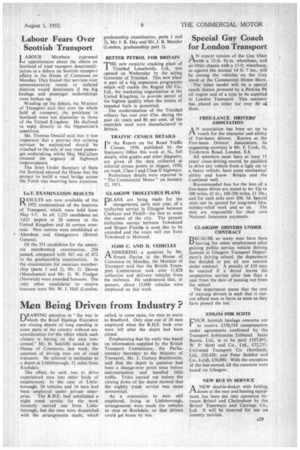Labour Fears Over Scottish Transport
Page 31

If you've noticed an error in this article please click here to report it so we can fix it.
I A BOU R Members expressed
L. apprehension about the effects on Scotland of road transport denationalization in a debate on Scottish transport affairs in the House of Commons on Monday. They feared that services over unremunerative routes to isolated districts would deteriorate if the big haulage and passenger undertakings were broken up.
Winding up the debate, the Minister of Transport said that over the whole field of transport, the problems in Scotland were not dissimilar to those of the United Kingdom. He declined to reply directly to the Opposition's assertions.
Mr. Thomas Oswald said that it was important that a proviso that existing services be maintained should be attached to the sale of any road passenger undertaking, whilst Maj. McCallum stressed the urgency of highways improvements.
The Joint Under Secretary of State for Scotland assured the House that the project to build a road bridge across the Forth was receiving keen attention.
Lo.T. EXAMINATION RESULTS
RESULTS are now available of the 1952 examinations of the Institute of Transport, which were held from May 5-7. In all, 1,223 candidates sat 3,621 papers at 28 centres in the United Kingdom and 16 centres overseas. New centres were established at Aberdeen and Georgetown (British Guiana).
Of the 351 candidates for the associate membership examination, 206 passed, compared with 365 out of 872 in the graduateship examination. In the examination for associate membership (parts I and 2), Mr. G. Dawes (Manchester) and Mr. G. W. Foulger (Norwich) were awarded honours. The only other candidates to receive honours were Mr. W. J. Hall (London, graduateship examination, parts 1 and 2), Mr. J. R. Day and Mr. J. B. Mander (London, graduateship part 2).
BETTER PETROL FOR BRITAIN
THE new catalytic cracking plant of Trinidad Leaseholds, Ltd., was opened on Wednesday by the acting Governor of Trinidad. This new plant is part of a big expansion programme which will enable the Regent Oil Co., Ltd., the marketing organization in the United Kingdom, to provide petrol of the highest quality when the return of branded fuels is permitted.
The modernization of the Trinidad refinery has cost over £5m. during the past six years and 86 per cent. of the materials used were manufactured in Britain.
• TRAFFIC CENSUS DETAILS IN the Report on the Road Traffic Census, 1950, published by the Stationery Office this week at 5s., full details, with graphs and other diagrams, are given of the data collected at selected census points in August, 1950, on trunk. Class 1 and Class II highways. Preliminary details were reported in "The Commercial Motor" on January 12, 1951.
GLASGOW TROLLEYBUS PLANS
PLANS are being made for the inauguration; early next year, of a trolleybus service in Glasgow between Clarkson and Firhill—the first to cross the centre of the city. The present trolleybus service between Townhcad and Mount Florida is soon due to be extended and the route will run from Townhead to Muirend.
15,000 C AND D. VEHICLES
A NSWERING a question by Mr. -1-1 Ernest Davies in the House of Commons on Monday, the Minister of Transport said that the British Transport Commission took over 11,828 collection and delivery vehicles from the railways. He understood that, at present, about 15,000 vehicles v.;ere employed on this work.




















































































